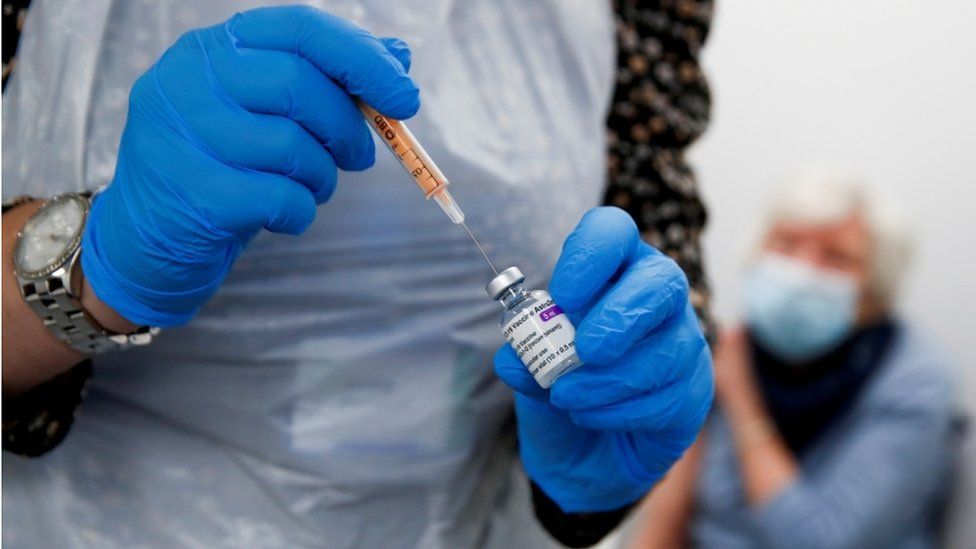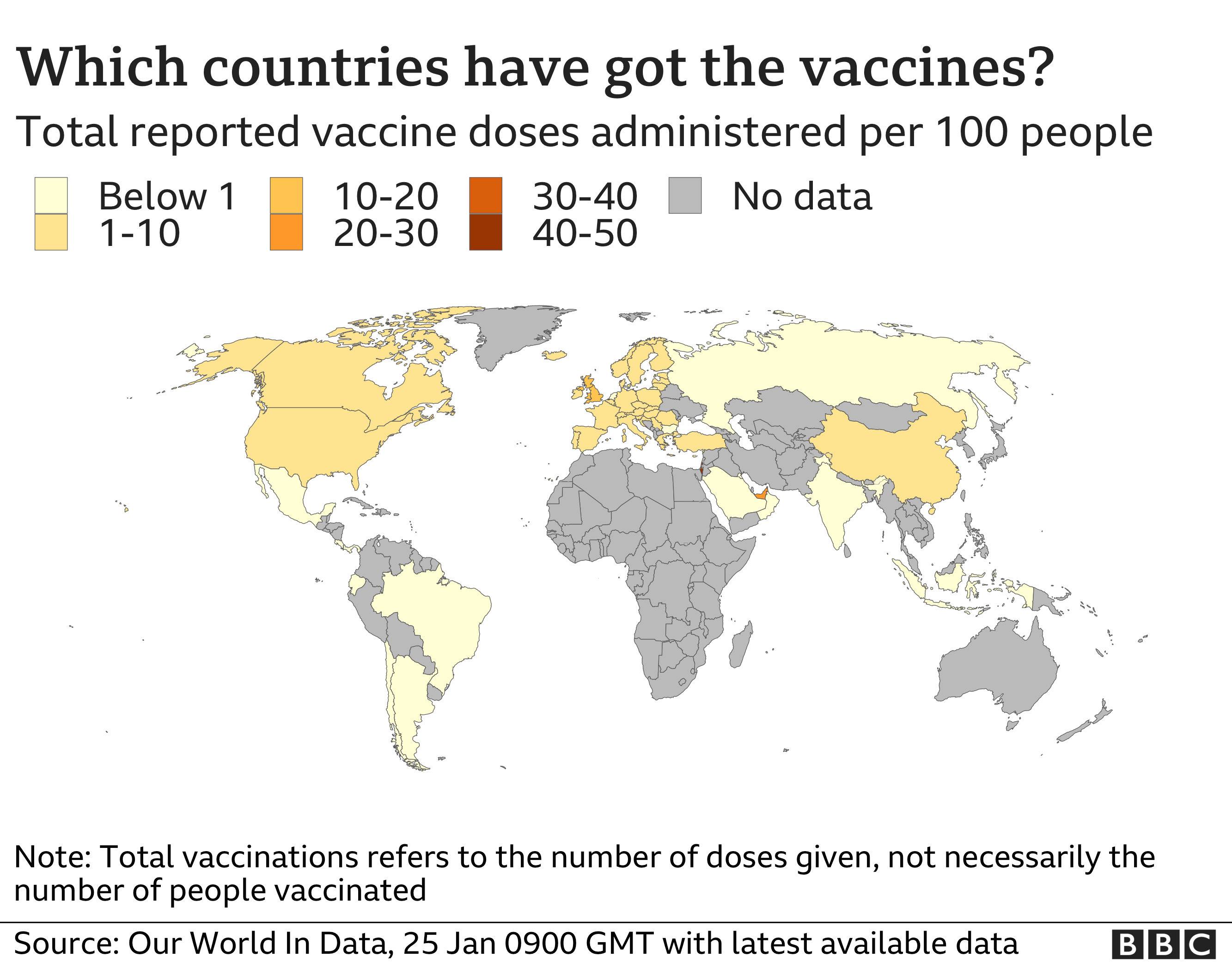The EU has urged pharmaceutical firm AstraZeneca to supply it with more doses of its Covid-19 vaccine from UK plants, amid a row over shortages.
The company has infuriated the bloc by saying it can deliver only a fraction of the doses it promised for the first quarter of the year.
It blames production issues at European plants, but the EU says doses made elsewhere should make up the shortfall.
The EU has been criticised for the slow rollout of its vaccinations.
A confidentiality clause binds AstraZeneca from releasing the details of its deal with the bloc, but the company reportedly said last week that the EU would get 60% fewer doses than promised for January-March 2021.
The two sides are set to meet for talks.
Earlier on Wednesday, an EU official said that AstraZeneca had pulled out of the meeting, but the company has since insisted it will attend.
Pfizer/BioNTech, which has an even bigger vaccine-production deal with the EU, is also experiencing delays.
French drug maker Sanofi has announced that it will help produce 125 million doses of the Pfizer/BioNTech jab by the end of the year.
The company will allow Germany-based BioNTech to use its facilities in Frankfurt from July, Sanofi said in a statement, having delayed the development of its own vaccine.
Pfizer says its agreement with Sanofi is just one of several efforts it is making to increase supply by expanding manufacturing facilities, and adding suppliers and contract manufacturers to its supply chain.
What is the EU complaining about?
At a news conference, EU Health Commissioner Stella Kyriakides said UK factories, which have not experienced problems, were part of its deal with the company and had to deliver.
"The 27 European Union member states are united that AstraZeneca needs to deliver on its commitments in our agreements," she said.
In an interview on Tuesday with Italian newspaper La Repubblica, AstraZeneca CEO Pascal Soriot said the contract compelled it to make its "best effort", rather than obliging it to meet a set deadline for delivery of the vaccines.
Ms Kyriakides said this characterisation of the deal was "not correct or acceptable", and called on the company to be "open and transparent" about its production of vaccines.
"We signed an advanced purchase agreement for a product which at the time did not exist and which still today is not yet authorised and we signed it precisely to ensure that the company builds a manufacturing capacity to produce the vaccine early so that they can deliver a certain volume of doses the day that it is authorised," she said.
She added that the EU rejected "the logic of first-come first-serve".

"That may work at the neighbourhood butcher's but not in contracts, and not in our advanced purchase agreements."
She appeared to be responding to Mr Soriot, who said that the UK had signed its contract with AstraZeneca three months before the EU and that this extra time had been used to "fix all the glitches we experienced" regarding the UK.
Meanwhile, UK Prime Minister Boris Johnson said: "I'm confident of our supplies and we'll keep rolling out vaccines as fast we possibly can.
"I am very pleased at the moment that we have the fastest rollout of vaccines in Europe by some way."

A deeply unpleasant row

In a nutshell, here is why EU officials are furious with AstraZeneca. They say the contract between them and the pharmaceutical giant clearly stipulates that the two main vaccine production factories in the UK are to be classed as primary manufacturing sites, and the production sites in Belgium and the Netherlands are secondary priorities.
The vaccine production issues are in Belgium and the Netherlands (they have been producing lower yields). So, this is a no-brainer to EU officials - the UK sites should be used to transport the vaccines across the continent.
And today's impromptu news conference by the EU's Health Commissioner Stella Kyriakides shows that any tolerance of the company's previous explanations has worn thin.
In fact, EU officials point out to me that EU money went into upgrading the facilities in the UK and that they fully expected it to be operational for them. This has turned into a deeply unpleasant row, and sets the stage for a difficult meeting with the UK-Swedish company.

What are the supply problems?
The EU signed a deal with AstraZeneca in August for 300 million doses, with an option for 100 million more, but the company has reported production delays at two plants, one in the Netherlands and one in Belgium.
Mr Soriot said production was "basically two months behind where we wanted to be".
Italy was among the countries threatening to sue over the delays.
The AstraZeneca vaccine has not yet been approved by the EU, although the European Medicines Agency (EMA) is expected to give it the green light on Friday.
The EU had hoped that, as soon as approval was given, delivery would start straight away, with some 80 million doses arriving in the 27 nations by March.
Officials have not confirmed publicly how big the shortfall will be, but Reuters news agency reported that deliveries would be reduced to 31 million - a cut of 60% - in the first quarter of this year.
The EU has also ordered 2.3 billion doses of vaccines from four other companies, of which only those of Pfizer/BioNTech (600 million) and Moderna (160 million) have been approved.
Pfizer has not been able to supply the 12.5 million vaccines it promised the EU by the end of 2020, saying last week it was delaying shipments for the next few weeks because of work to increase capacity at its Belgian processing plant.
The EU has threatened to restrict the exports of vaccines made within the bloc to deal with the shortfall.
The head of BioNTech, Uğur Şahin, in an interview with Germany's Der Spiegel magazine, explained the delay by saying the EU had wrongly assumed that several vaccines would be ready at once and therefore spread its orders. He also said his company was ramping up its manufacturing capacity.
What about the UK?
The UK did not take part in the EU vaccine scheme, although it could have done until the end of 2020, while it was still in the Brexit transition period.
At the time, the government said it was opting out because it felt it wouldn't be allowed to continue its own negotiations with potential suppliers and wouldn't have a say on the price, volume and date of possible deliveries.
The UK was the first country in the world to approve the Pfizer/BioNTech vaccine (and rolled it out several weeks before the EU).
The UK has also approved the Oxford/AstraZeneca vaccine and the Moderna vaccine.



Have you been affected by vaccine supply issues? Share your experiences by emailing haveyoursay@bbc.co.uk.
Please include a contact number if you are willing to speak to a BBC journalist. You can also get in touch in the following ways:
- WhatsApp: +44 7756 165803
- Tweet: @BBC_HaveYourSay
- Upload pictures or video
- Please read our terms & conditions and privacy policy
If you are reading this page and can't see the form you will need to visit the mobile version of the BBC website to submit your question or comment or you can email us at HaveYourSay@bbc.co.uk. Please include your name, age and location with any submission.
World - Latest - Google News
January 28, 2021 at 12:52AM
https://ift.tt/3qPgonU
Coronavirus: EU demands UK-made AstraZeneca vaccine doses - BBC News
World - Latest - Google News
https://ift.tt/2SeTG7d
Bagikan Berita Ini














0 Response to "Coronavirus: EU demands UK-made AstraZeneca vaccine doses - BBC News"
Post a Comment